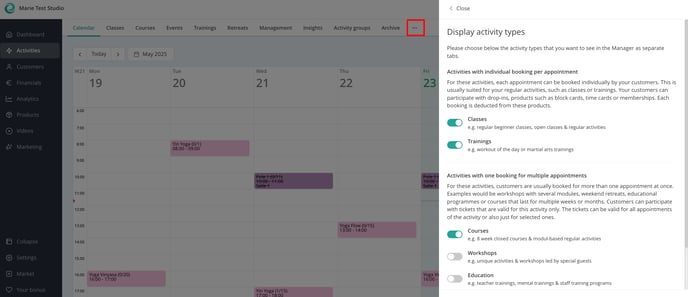What Activity Types are there?
Learn the differences between Classes/Trainings and Multi-Session Activities (Course, Workshop, Training, Retreat, Camp, Event)
1. Introduction to Activity Types
In your Eversports Manager, you can create 2 types of activities:
-
Type 1 - Activities with booking per date: Classes and Trainings
-
Type 2 - Activities with booking for multiple dates (multi-session events): Courses, Workshops, Trainings, Retreats, Camps, Events
Within the same activity type, the settings are the same - only the name of the activity changes.
You can customize the activity types displayed based on your needs. To do this, go to the Activities menu, click on the three dots in the upper right corner, and enable or disable the respective activity types.
Tip: Only display the activity types you actually work with, so everything remains clear!

Type 1 - Classes/Trainings
For these activities, each appointment can be booked individually by your customers. This is usually suited for your regular activities, such as classes or trainings. Your customers can participate with drop-ins, products such as block cards, time cards or memberships. Each booking is deducted from these products.
Classes & trainings are open, i. e. the participant books each date individually.
➡️ Example: Continuous yoga class that takes place every Monday. The participant books her-/himself e. g. with her/his ten card and gets one unit per appointment deducted from her/his card.
👍Advantage: High flexibility, participants can register and sign-out for individual appointments.
⚠️ Attention: Participants cannot book for more than one date in one booking process. They have to register individually per appointment. (Tip: As an admin, you have the possibility to register participants for classes and trainings on a recurring basis, more information here).
💡 Matching registration type: Products - basically suitable for all products (block cards, time cards, memberships).
Article: Create classes and trainings
Type 2 - Courses/ Workshops/ Camps/ Events/ Retreats/ Educations (so-called Multi-Session Activities)
👍 Advantage: Participants book themselves for an entire course in one booking process and pay a total price.
Note: Participants cannot make up any missed hours. If a participant is absent, they are responsible for the missed session unless you choose to make an individual arrangement.
- With single and combined tickets
- With products
Important: Once the activity is created, the registration type cannot be changed.
1. With single and combined tickets

You can create tickets specifically for this activity:
-
One total ticket for all dates
-
Tickets at different prices only for selected dates of your choice
-
Special tickets for early bird and last minute registrations
Note: The "Tickets" tab will only appear once you have created at least one date

2. With products
Important: With this type of registration, customers are automatically enrolled in all dates. If you link this activity to a product, only one unit will be deducted for all dates!
You can:
-
Select the block cards and memberships (created in the "Products" tab) that can be used to register for the activity.
-
Set the price for a single ticket covering all dates.
Note: Unlike a booking with a product, the customer is refunded if they cancel their reservation early enough.
2. What does it look like from the customer side ?
On the Eversports App and Eversports Marketplace, customers can easily distinguish between Classes/Trainings and Multi-session Activities (such as courses, events, or workshops), as they are displayed separately:
- In the App:

- In the Marketplace:
- On the widget:

You can also create custom links to highlight specific types of offerings: one link showing only your multi-session activities, another link dedicated to workshops, for example.
Tip: Learn how to create and customize your widget links with these guides:

